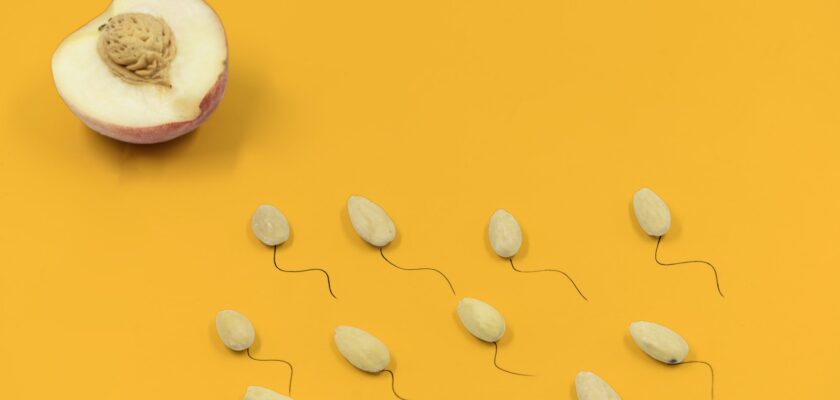The phallic-shaped fruit is rich in Vitamin B1, Vitamin C and magnesium. It also contains Bromelain, a rare enzyme that boosts the sperm count and improves its motility.
Leafy greens, avocado and oranges are rich in folate, a B vitamin that may help prevent leukocytospermia, a condition that can cause ejaculate to contain too many white blood cells. Folic acid also increases semen volume.
Lentils
A diet high in fiber, vegetables, fruits and legumes may help improve sperm quality and increase fertility. In fact, a recent study showed that men who ate more plant-based whole foods had higher sperm concentrations than those who didn’t. This is because plant-based whole foods are rich in vitamins, minerals and antioxidants that protect the body from oxidative stress.
Lentils are easy to digest and a plant source of iron, folate and protein, all of which are necessary for healthy sperm. Folic acid is also known to reduce the rate of sperm abnormalities and improve semen quality. You can add lentils to soups or use them in curries and salads.
Another food that is good for sperm health is blackberries, which are rich in folic acid and vitamin C. They are also an excellent source of a nutrient called L-arginine, which increases sperm count and motility. You can eat them raw or cook them with a light vinaigrette.
Bananas are good for your sperm because they contain vitamin B1 and Vitamin C, which are essential for the formation of healthy sperm cells. They also contain a rare enzyme, Bromelain, which reduces inflammation and helps the body produce stronger sperm – This section is the creation of the portal’s experts XXX Teens Sex.
Zinc
Zinc is an essential nutrient for the reproductive system. It helps to maintain healthy sperm and improves ejaculate volume. Zinc is also an antioxidant that protects sperm from free radical damage. Increasing the intake of foods rich in zinc can help increase sperm count and sperm morphology, making them more likely to reach and fertilize an egg. Zinc can be found in eggs, red meat, poultry, whole grains, fortified cereals and legumes. Other sources of zinc include seafood, yoghurt, pumpkin seeds and chia seeds.
Vitamin C is another important dietary supplement for men who are trying to boost semen production. Vitamin C acts as an antioxidant, protecting sperm from free radicals and stimulating their movement. Vitamin C is found in kiwis, citrus fruits, tomatoes and cabbage.
Pomegranate juice contains an enzyme called allicin that can help reduce sperm damage caused by free radicals, and it may improve sperm count and ejaculate volume. In addition, pomegranate juice can lower the amount of harmful substances in the blood that affect sperm, including malondialdehyde.
Other natural ways to improve sperm health include consuming omega-3 fatty acids, which are known to boost fertility in both men and women. These can be found in fish like salmon, mackerel, herring and sardines, as well as in walnuts and plant-based options such as chia seeds and ground flaxseeds.
Ashwagandha
Ashwagandha is an adaptogen that can help to boost sperm health. It’s also an antioxidant that can protect sperm from oxidative stress. A study published in the journal Phytomedicine found that ashwagandha supplements can increase sperm count and motility and improve levels of reproductive hormones. It also reduces oxidative stress in the testis, which can cause sperm damage.
The study examined 46 men with oligospermia (sperm counts lower than 20 million per milliliter of semen). They were randomized to receive either a high-concentration, full-spectrum ashwagandha root extract or placebo. The researchers evaluated sperm quality and serum reproductive hormones after 90 days of treatment. The ashwagandha root extract significantly increased testosterone levels, which improved sperm motility and sperm volume.
Another popular sperm booster is maca root, a plant native to central Peru that is traditionally used to enhance libido and fertility. Several studies have shown that taking 1.5-3 grams of maca root for up to three months can improve self-reported sexual desire and sperm health. It can also increase testosterone and sperm motility, as well as decrease oxidative stress in the testis.
Omega-3 fatty acids are essential for sperm health, and walnuts are an excellent source. They also stimulate nitric oxide production, which prevents clogged vessels and increases blood flow to the penis. You can add walnuts to your meals or take them in a supplement.
Garlic
Aside from being a powerful aphrodisiac, garlic contains allicin, which improves blood flow to the reproductive organs and helps protect sperm from damage. It also contains selenium, which improves sperm motility. Eat one or two cloves of garlic a day.
Vitamin C is another important nutrient for healthy sperm. Eating kiwis, strawberries, tomatoes and other citrus fruits can help boost your levels of this antioxidant. Leafy vegetables and berries are also rich in this vitamin, so add spinach, kale, avocado, radish and broccoli to your diet. These foods are also high in folic acid, which is required for the production of healthy sperm.
Zinc is also essential for sperm health. Eggs, red meat and shellfish are good sources of zinc. Pumpkin seeds are another natural source of this mineral and are also high in antioxidants. Add these to your diet or take a zinc supplement.
Pomegranates are also great for sperm health. They contain a powerful antioxidant called lycopene, which helps improve sperm count and quality. To get more pomegranate in your diet, try drinking a glass of pomegranate juice every day. You can also add pomegranate powder to your smoothies and salads to get more of this fruit in your diet.

